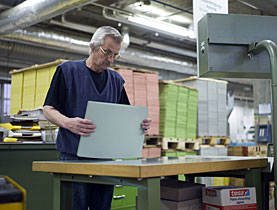Trends threaten wellbeing of workers

Buildings that are too clean, vehicles that are too quiet and workers who are always on call – these are risks facing us in the future, according to a study.
Suva, the Swiss accident insurer, commissioned the report to see what kinds of issues could have a detrimental effect on the workforce and general public in 2029. In consultation with businesses the research team identified 21 trends to watch out for.
“Preventive health protection depends on identifying risks early and assessing them correctly. Our rapidly changing world challenges us to intensify the early detection of trends and developments,” Suva manager Edouard Currat wrote in the 58-page study’s foreword.
Many of the trends foreseen are rather negative; for example, electro-vehicles that are so quiet that pedestrians don’t hear them approaching – thus increasing the risk of accidents.
In addition, the burden on healthcare workers will grow if they’re required to lift increasingly overweight patients.
Meanwhile, “sick building syndrome” could be replaced by a “too-clean” version in which people’s immune systems are weakened by excessively hygienic conditions.
The report also cited more psychological threats such as the round-the-clock availability facilitated by smart phones and the fading corporate memory caused by modern-day job-hopping.
Stress test
The primary threat isn’t particularly futuristic at all.
“I think one of the biggest risks in the future workplace is stress. Due to the acceleration of almost everything, people are more and more stressed out. Soon there will psychological reasons for missing work – not the flu,” Georges T. Roos told swissinfo.ch.
Roos, the Lucerne-based futurist researcher who led the study, attributes this to the “blurring” between the borders of work time and leisure.
Dario Mordasini of the Swiss trade union Unia notes that this problem is far more prevalent than it was 40 years ago and thinks that it will be increasingly so in 20 years.
Mordasini, Unia’s expert on occupational health, told swissinfo.ch that the Suva study was “a very important step in the right direction”.
Coping
Asked what people can do to ward off future problems, Roos said it was up to employers in particular to take action.
“Companies have to find ways to deal with email, for example. This continuous form of interruption while working is elevating stress levels. Efficiency goes down and that’s something companies really need to think about,” Roos said.
Mordasini agreed that mobile phones, laptops and other modern inventions were a mixed blessing – for office workers, especially.
“These tools have simplified a lot of things, but we can also see how people have trouble coping. People are constantly available – you can check your email anytime and anywhere – and some managers expect employees to check their email during holidays or at weekends,” Mordasini said.
He added that guidelines were needed, and called on politicians and society to set clear limits.
Roos noted that personal behaviour was another important aspect of coping.
“It’s also about having and following your own rules and thinking about how to spend your spare time and personal life. It’s good to move around and get physical, too,” pointed out Roos, who jogs about three times a week.
Ambient intelligence
On a more positive note, the study predicted other trends that will make life easier, safer and happier.
“Ambient intelligence provides a lot of opportunities to prevent accidents and make the workplace safer – like a saw that can ‘see’ a finger in its path and stop, or cars that can recognise slippery roads,” Roos said.
Meanwhile, society is ageing differently – which is a benefit both for individuals and employers.
“Biological ages are going down, which means people are more fit and are participating more in the workforce. On average, people are in much better shape than their cohorts were 20 years ago,” Roos said.
Established in 1918, Suva is an independent, non-profit company under Swiss public law.
Its business activities are based on accident insurance law.
It mainly insures companies in the secondary business sector, i.e. industrial trading and commercial enterprises.
Nanotechnology
Hunt for happiness
Human performance enhancement
Electro-vehicles
Open-source
“Teenaging” of society
Overweight patients
Self-employment
“Intrapreneurship”
Fading corporate memory
Unique ability
24/7 availability
Mental problems
Ambient Intelligence
Globalisation
Social inequality
Non-transparent systems
Too-clean building syndrome
Computer games
Rapidly ageing workforce
Ageing motorists

In compliance with the JTI standards
More: SWI swissinfo.ch certified by the Journalism Trust Initiative












You can find an overview of ongoing debates with our journalists here . Please join us!
If you want to start a conversation about a topic raised in this article or want to report factual errors, email us at english@swissinfo.ch.